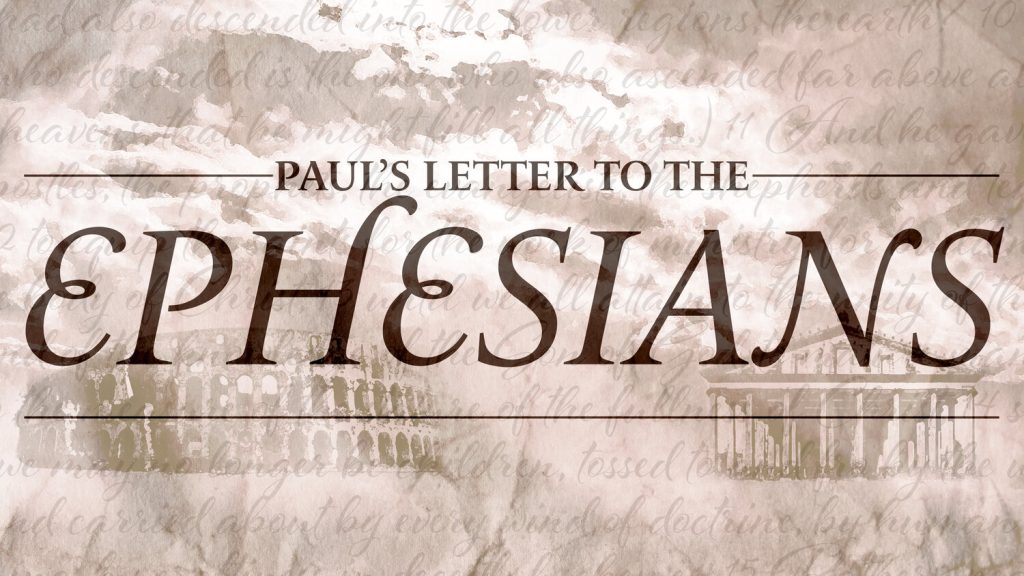This Tuesday will be discussing Ephesians 5:1-20, where Paul continues his encouragement for his audience to leave behind the behaviors of the world, and to live as Christ would have us live.
Big Gospel Picture:
As Paul goes further into those behaviors that he expects of his Christian community, we cannot lose sight of Paul’s Gospel teaching and we must allow that teaching to be the lens through which everything else Paul writes is interpreted. This Gospel is that the death and resurrection of Christ Jesus, allows us, through the mediation of the Holy Spirit, to be in union with God. Eph. 3:14-19. Paul’s teaching is not to ultimately set up a new system of belief or moral rules, but to proclaim the sudden unveiling of the mystery hidden in God since the foundation of the world, which overturns all rulers on earth and in the heavens, abolishes the wall that the Law and religious requirements and observances create, and ushers in the imminent and realized Kingdom of God in which all persons partake by the grace of God. Eph. 2:14-3:3.
For Paul, the church, the community of believers is the first-fruits and very embodiment of this Gospel. Eph. 3:8-10. Our behaviors do not make us more right with God or more worthy of his grace. Rather, our behaviors should reflect the new reality that Paul proclaims. Eph. 2:8-10.
Therefore, as we continue through these readings on Christian ethical behavior, Paul is not replacing the old written Jewish Law with a new and improved written Christian Law, but is telling his audience what a grace-filled, life in Christ should look like within their own particular historical and cultural situation. Eph. 4:13-16. The Holy Spirit is always blowing new life into the church, and so as we read through Paul’s specific ethical rules, we must always be careful not to set up a new unchangeable Law, but see how the Spirit speaks to us specifically as to how we should govern ourselves in the light and life of the divine apocalyptic mystery that we must continuously proclaim. 2 Cor. 3:2-6.
Within Paul’s moral discourse in the remainder of Ephesians, Paul’s concern is not individual actions, per se. Paul recognizes that all people sin and that sin is working actively within us. Rom. 3:23, 7:13. Rather, what Paul writes against is our giving up ourselves without shame or repentance to this way of life. We will all sin, but the question is who is our ultimate master, and to whom do we owe our allegiance – sin or righteousness? Rom. 6:15-23
The Imitation of God in Christ: (vv.1-2)
The summation of Paul’s ethical rules is contained in 4:32-5:2 – Give grace to one another, just as God in Christ gave grace to you and be imitators of God, to walk in love with one another just as Christ sacrificially loved you. God in Christ does something for us and therefore we in Christ do the same to others. The Greek word for “imitate” is mimetes meaning to to mimic or impersonate. All of Paul’s ethical teachings go back to the sole requirement that we emulate, mimic, impersonate, or become just like Jesus. Phil. 2:5, 1 Thess. 1:6.
Porneia: (vv. 3-5)
Having set forth the general standard of Christian behavior, Paul begins to contrast this standard with certain specific behaviors. The first immoral behavior that Paul takes up is sexual immorality or porneia, which comes from the Greek word “to sell.” For most of human history, and even into the modern day, “sexual immorality” generally only constrained the actions of women. For example, the whole purpose of marriage linking a specific man to a specific woman was to insure that her offspring was his also. We see this in the Law, where “adultery” is defined as having sexual relations with another man’s wife. Lev. 20:10. And in the story of Judah and Tamar, where Tamar having an unexplained pregnancy means her death, but Judah’s sexual relationship with her when whe pretended to be a prostitute is morally neutral. Gen. 38. Paul’s teaching on sex goes beyond the morality of his day, because such actions are inappropriate and not befitting the saints. See, also, 1 Cor. 6:12-7:40.
Greed and Speech: (vv.3-5)
The other two sinful activities that Paul directly addresses are covetousness and improper speech. The word Paul uses for covetousness implies an insatiable, acquisitive, rapacious desire which Paul equates with idolatry. This is one of those sins, which is consistently condemned by Scripture because it is the root of other sins and inappropriate behaviors.
Within this same section, Paul warns against idle speech. There are three types of speech that Paul specifically mentions in verse 4: obscenity, foolish talk or words lacking in wisdom, and coarse humor. Paul is essentially equating dirty jokes with actual sexually immoral acts. But, this is the same type of teaching that Jesus gives us in the Sermon on the Mount when he equates insulting a person with murder. Matt. 5:21-22. It is the state of our hearts that matters, not so much the acts themselves. Therefore words are just as much evidence of a heart enslaved to sin as are actual actions.
Dinner is a 6. The menu is Oktoberfest. Discussion about 6:45. Compline around 8. Hope to see you here!
Keep your heart with all vigilance;
for from it flow the springs of life.
Put away from you crooked speech,
and put devious talk far from you.
Proverbs 4:23-24


Pingback: Ephesians 5:21-33, Household Codes pt.1 – Ancient Anglican
Pingback: The Gospel of Luke – Luke 16:1-17:10 – Faithfulness in Wealth – Ancient Anglican